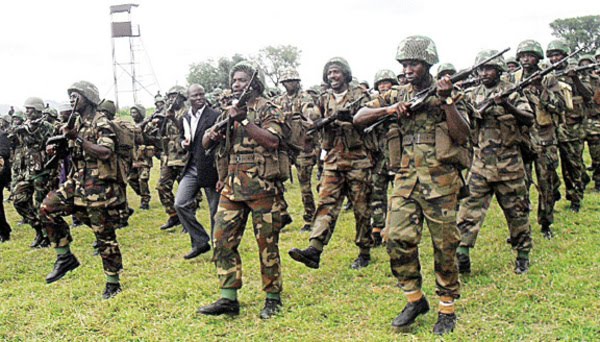
With that being said, it's very peculiar that for a country that seemingly cares about human rights issues, many (myself included) are just now finding out about the abduction of 200+ girls from Chibok, Nigeria. The kidnappings occurred almost a month ago, yet this story has only recently surfaced in American media within the last week or so. Considering the magnitude of the issue at hand, I can’t help but ask the question: why has it taken so long for us to find out?
The blatant inaction from both sides is appalling. The US is doing a disservice to Nigerians everywhere by remaining quiet on what actions will be taken against the kidnappers and ultimately Boko Haram as a group. ALL of these girls were illegally abducted from their homes and sold to the US for $12. TWELVE AMERICAN DOLLARS, nearly the average price for a pack of cigarettes. Apparently, this is the buying price for the life of a young girl. This directly implicates us in the violation of human rights that we have fought so hard against in this country.
It comes as a surprise that Obama, an African-America himself, has yet to impose international sanctions against Nigeria for allowing these atrocities to occur right under the noses of government officials. The response time in tracking down the whereabouts of Boko Haram has been deplorable: Senator Ahmad Zanna has served as a watchdog to Nigerian military, keeping them posted on the terrorist group's locations, only to be greeted with a wait time of two to three days before troops were sent searching. Several senators have urged the Nigerian government to seek international help to increase the chances of returning these girls to their families safe and sound. At this point, the US should not have to wait for Nigeria’s request for aid- we should have already supplied them with the proper militia to tighten the search for the kidnapped. Nigerian intelligence should be collaborating with the CIA and US military forces on how to go about finding Boko Haram and the proper negotiation tactics needed to take these men down.
Now, let’s get back to the question at hand: why has the American media taken so long to publicize this story? Why is it that the Crimea-Russia conflict, already more than two months old, is still making front-page headlines on CNN, HuffPost, and USA Today, but the Chibok kidnappings are shoved into a corner of the screen with merely a blue link to click upon, no photos, no video, and a shortened account of the atrocities that are still taking place? Why has an ongoing 5-year conflict only reached our television screens NOW?
The immediate answer that comes to mind is many statesmen arguing the lack of financial benefit helping Nigeria will have to the United States. Not only is this untrue, it wouldn’t make sense from an economic standpoint. Nigeria is the currently the economic powerhouse of Africa, with Forbes stating that “many of the richest black men and women” come from there. Nigeria’s government is similar to ours in that they also maintain a capitalist economy, which explains why the balance of trade between the US and Nigeria has proven to be extremely favorable since 1999 (with the exceptions sanctions imposed against the country in 1993 for several human rights violations and the death of General Abacha in 1998), and also why Nigeria is considered to be the United States' greatest diplomatic partner in Africa. With 67% of Nigerians viewing America’s influence as positive, it is mandatory that we help a nation that constantly looks to the US for guidance in their time of need.
An unpopular and lesser-explored answer to this question lies with America’s current affliction with race. More often than not, stories of abduction that don’t deal with a white child are often overlooked or shelved for a long time before the public’s discovery. Last year, the story of an American woman who disappeared in Turkey made headlines for several months before she was discovered to be dead in a remote area. The media clung onto the Caylee Anthony story for almost an entire year before deeming it a closed case and the subsequent sentencing of Casey Anthony. Twenty years ago, the country’s heart bled for Jon Benet Ramsey and her parents when she was abducted in 1995 until almost a decade after her abduction, the media still talked about it and even held a television special on ABC where the parents discussed how they still long to hold “their baby” for 60 minutes. What about the hundreds of Nigerian mothers who have gone sleepless over the last month, racking their heads on where their daughters are, and if they are even alive, literally crying out for government help, only to have their cries fall on deaf ears?
America is well known for it’s pick-and-choose mentality on which international issues are deserving of our attention. It is time for that attitude to end here. If the US continues its inaction against Boko Haram, we are at risk of losing the “hero” title that we have loved shoving in every country’s face over the last 68 years. More importantly than our reputation, our morality is at stake. We owe it to Nigeria to find those 200 girls and bring them home as we do our troops, as we do our kidnapped, as we do our tortured and prisoners of war. Until we realize the dangers of inaction, there will be no reaction. I pray that President Obama will make the right choice over the next few days and vow to search for these girls as tirelessly as he did Al-Qaeda, because the biggest threat to these women is not Boko Haram, but ignoring their cries for help as the rescue window grows smaller.
No comments:
Post a Comment